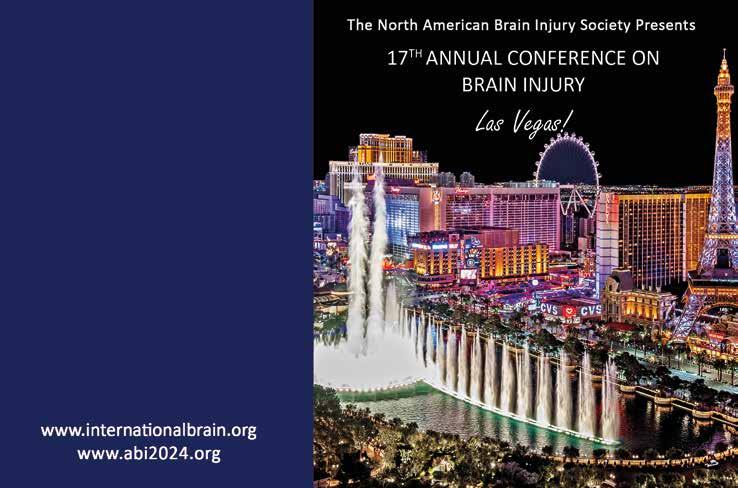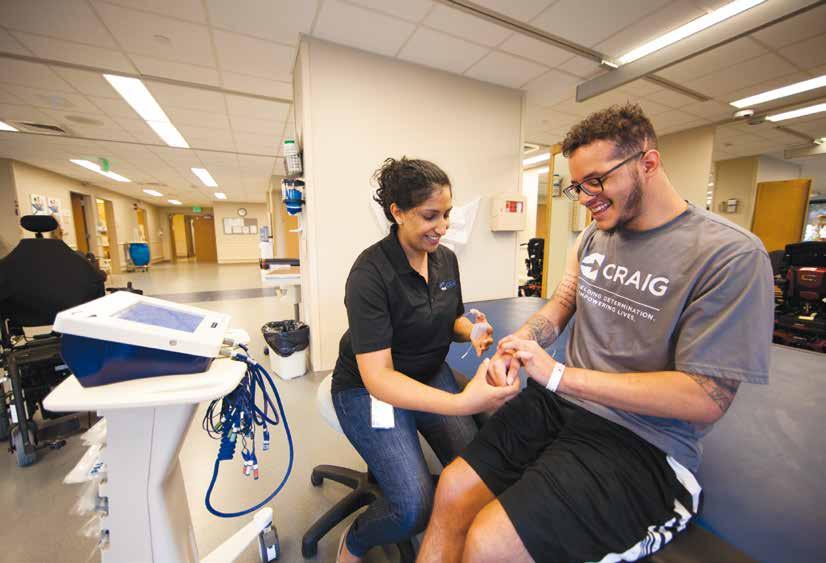
7 minute read
Motivational Interviewing: Improving Patient Engagement in Brain Injury Care
In the healthcare landscape, patients with brain injury are experiencing shorter hospitalizations, which is pushing a significant amount of rehabilitation into ambulatory settings. This places greater demand on patients and families to be responsible for selfmanagement of health behaviors and neurobehavioral symptoms, which can be very daunting. Such circumstances necessitate that patients and caregivers are optimally engaged in their care process across the continuum. When patients are more engaged in care, they are more likely to follow through on desirable health behaviors, have better health outcomes, and experience improved satisfaction with care received.1 Improved patient engagement is associated with a sense of partnership between clinicians, patients, and families.
Creating partnership with patients who have brain injuries requires a skill set that health care professionals do not traditionally learn during formal training. Patients with brain injury often experience cognitive impairments influencing their attention, processing speed, memory, executive functions, and/or language, which can interfere in their ability to engage in the health care process.2 Other neurobehavioral symptoms such as poor insight and awareness, amotivation, and impulsivity can make treatment engagement more challenging. Clinicians who use strategic relationship-building approaches and behavior change principles are more successful in promoting partnership thereby optimizing patient engagement in care. To be successful in delivering brain injury care, clinicians need strategies and tools to build trusting therapeutic alliances, support goal-setting, and engage patients as partners.
While there are several approaches for promoting patient partnership, Motivational Interviewing (MI) is an evidenced based approach shown to change health behaviors and increase patient and family engagement in health and health care.3 Initially developed to promote engagement of individuals with substance use disorders in treatment programs, it has since been expanded and found to be effective with patients managing chronic health conditions. MI is not considered a therapeutic approach and therefore can be utilized by a wide range of health care professionals. Though the literature is limited in using MI with individuals with brain injury, there are studies to support that using MI-infused cognitive behavioral therapy has better effects on the reduction of anxiety and depression symptoms after brain injury.4 MI has also been shown to be a feasible intervention for individuals with brain injury and to have positive effects on likelihood of alcohol abuse after inpatient rehabilitation hospitalization.5
The foundational concepts and skills of MI emphasize building a collaborative relationship in which intrinsic motivation is cultivated. With MI, the patient's autonomy is respected and their personal goals are elicited, elucidated, and pursued.
Therefore, MI is particularly useful when working with patients and/or caregivers who are hesitant, reluctant or ambivalent about some aspect of their care3. Given the cognitive impairments and neurobehavioral changes experienced by patients with brain injury which may present as apathy, defensiveness, and mistrust, adapted MI may be very useful with this population.
In using MI, one is guided by a specific spirit or way of being with the patient. This spirit involves accepting the patient’s level of readiness, showing compassion for the patient’s circumstances, weaknesses and strengths, and evoking the patient’s values, wants and needs. When we convey acceptance, compassion, and evocation (“ACE”), we create a partnership with the patient. Demonstrating ACE toward patients becomes increasingly difficult when clinicians struggle to manage their own stigmas and expectations of themselves, the patient, or the family. Clinicians working with patients with brain injury, especially those new to the work, may face these challenges at more frequent rates. Patients with brain injury often present with particularly difficult to manage symptoms that can interfere in behavioral engagement, memory, and emotional connection. To avoid this, clinicians must practice regular self-reflection, checkingin on misconstrued assumptions or judgments about the patient and their injury. It may also be important to check-in on clinicians’ assumptions about how useful MI or even rehabilitation may be with the patient, as such beliefs are likely to negatively influence patient engagement.

MI consists of four patient-centered processes: engaging, focusing, evoking and planning. Guiding a patient through these processes helps to clarify patient goals, align provider and patient treatment targets, and move the patient in their desired direction. Engaging, or rapport building, will be an especially important process when working with brain injured individuals. Using ACE to establish trust, connection, and a sense of teamwork can foster engagement even with patients who have limited insight, decreased awareness, and emotional or physical impulsivity. Revisiting the engaging phase frequently will be imperative for many individuals with brain injury, especially those with memory impairment or with those who become “stuck” in the care process. Stuckness, often observed as refusals, defensiveness, and apathy, requires a re-connection between the patient and clinician. Therefore, revisiting the engaging phase is an intervention to optimize partnership and improve patient engagement, rather than a needing to “start over” or a treatment failure.
The four foundational techniques in MI are open-ended questions, affirmations, reflections and summaries. When used effectively, these techniques convey empathy, increase patient autonomy, and help health care professionals be more time-efficient. Depending on a patient’s severity of brain injury, open-ended questions may pose more challenges than benefits. However, it is still best to begin with an open-ended question as this gives the patient a sense of control and autonomy, experiences that patients with acquired brain injury have infrequently, especially during hospitalizations. If open-ended questions are met with tangentiality or confusion, the clinician can narrow the question to verbal options or visual options.
If a clinician needs to move to yes/no questions to understand the patient’s symptom experience, asking permission first infuses the closed-ended question with the MI spirit (“Would it be okay for me to ask you a few questions?”).
Affirmations, acknowledging important positive patient characteristics or values, are useful to increase the confidence of patients with brain injury who may experience low self-efficacy, and frustration with themselves or others. It is also helpful to use frequent and brief reflections, or repetitions of what the patient says, to reinforce emotional connection and highlight patientidentified reasons to change. Finally, summaries are highly useful working with this population. Similar to reflections, providing summaries at the end of the encounter or before switching tasks can enhance the patient’s memory and understanding of next steps. Even better is for the patient to provide the summary. Together the MI spirit, processes, and skills empower individuals towards goal attainment and independence, which is highly consistent with the values of brain injury rehabilitation and care.
To support and promote broader utilization of MI and other patient engagement skills, our team has developed the Patient Engagement Program (www.HopkinsPEP.org) and the Rehabilitation Engagement Collaborative (REC; www.rehabilitationengagementcollaborative. org). Customization of the live skills workshops that are associated with these programs may be useful when training professionals who are working with individuals with brain injury.
PEP is a comprehensive evidence-based training program that builds health care professionals’ skills in communicating with patients in a way that increases patient engagement in health care, improves health outcomes, and enhances patient experience. PEP incorporates MI and other methods of communication science like shared-decision making and health literacy approaches. In PEP’s planning phase, we develop a plan that clarifies training goals and tailors training for the needs of the practitioners. In the training phase, PEP combines an asynchronous e-learning curriculum where learners establish foundational MI principles and skills with an inperson skills workshop where learners practice MI skills. To maintain skills over time, a maintenance phase is needed. In PEP we use 1) a monthly emailed “Tip of the Month,” and 2) implementation of a champion program in which unit-based or team-based leaders carry out brief monthly activities with their teams. Finally, an evaluation phase determines if training goals are being achieved and translating into improved patient engagement, satisfaction and outcomes.
We developed the REC to fill a gap in MI training materials specific to medical rehabilitation professionals. The REC provides online, asynchronous MI training materials to rehabilitation professionals. The materials include mini-webinars describing the foundational principles, spirit, processes, and skills of MI, as well as training videos of rehabilitation clinicians utilizing MI with real patients.
Despite limited research on using MI with patients with brain injury, the MI spirit, processes, and skills align well with this population. A clinician can utilize self-reflection strategies to check on preconceived notions and insure embodiment of the MI spirit during patient and caregiver interactions. Focusing heavily on the engaging phase, including revisiting this phase at signs of patient or caregiver reluctance, will help the patient to feel connected and be more willing to engage. Using MI skills strategically and especially during times of patient irritability or defensiveness will support clinician-patient partnership and foster patient engagement, thereby improving patient health outcomes and patient experience in care.
References
1. Coulter, A. Patient engagement: What works? J Ambulatory Care Manage. 2012;35(2):80-89.
2. Diamond, PT, Felsenthal, G, Macciocchi, SN, Butler, DH, Lally-Cassady, D. Effect of cognitive impairment on rehabilitation outcome. Am J Phys Med Rehabil. 1996;75(1):40–43.
3. Miller, WR, Rollnick, S. Motivational interviewing: Helping people change (3rd edition). Guilford Press; 2013.
4. Ponsford, J, Lee, N, Wong, D, et al. Efficacy of motivational interviewing and cognitive behavioral therapy for anxiety and depression symptoms following traumatic brain injury. Psychol Med. 2016;46(5):1079-1090.
5. Bombardier, CH, Rimmele, CT. Motivational interviewing to prevent alcohol abuse after traumatic brain injury: A case series. Rehabil Psychol. 1999;44(1):52-67. https://doi.org/10.1037/0090-5550.44.1.52
Author Bios
Nicole Schechter is a board-certified rehabilitation psychology and Assistant Professor of Physical Medicine and Rehabilitation at Johns Hopkins University School of Medicine. Nicole received a BS in Clinical Psychology from Tufts University in 2007, a Master’s Degree (2009) and Doctorate of Psychology (Psy.D.) in Clinical Psychology from Loyola University Maryland in 2013. Nicole then completed a post-doctoral fellowship in rehabilitation psychology at Johns Hopkins University School of Medicine in 2015. She has been working in the field of rehabilitation since 2015. A founder and co-director of the Johns Hopkins Patient Engagement Program (PEP; www.hopkinspep.org) and the Rehabilitation Engagement Collaborative (REC; www.rehabilitationengagementcollaborative. org), Nicole is passionate about disseminating motivational interviewing and shared-decision making training to health care colleagues. She and her team have implemented PEP at Johns Hopkins in various capacities as well as at other institutions nationwide.
Kristen Mascareñas Wendling is a speech language pathologist at Craig Hospital in Englewood, Colorado. She received her bachelor’s degree in Speech Language and Hearing Sciences and Spanish Language and Literature from the University of Colorado in 2008. She received her master’s degree in Speech Language Pathology from the University of Iowa in 2011. Kristen started at Craig Hospital in 2012 and quickly became passionate about motivational interviewing. Kristen enjoys mentoring others as they learn to honor their patients’ autonomy and holistically engage their patients in the rehabilitation process.










